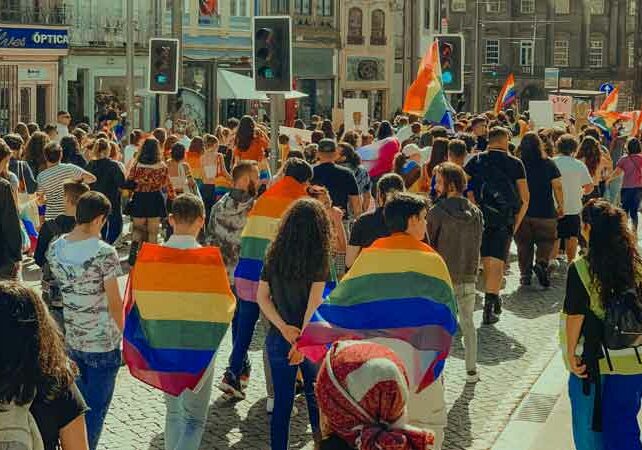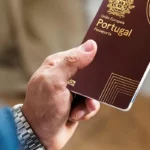If you’re someone who identifies as a member of the LGBT community (lesbian gay bisexual trans), and you’re considering moving abroad, Portugal could be a good place to relocate to. Over the years, Portugal has made significant advances concerning sexual orientation and gender identity, and become one of the most tolerant countries in the world for LGBT people.
Before you make that decision, it’s crucial to understand the nuances of the local cultural perspective toward the LGBT community, the legal protections and rights you are granted, as well as which locales offer the most inclusive environments. This comprehensive guide delves into these topics, offering a clear picture of the LGBT experience in Portugal.
You’ll also find out about:
How LGBT-friendly is Portugal?

Portugal secured a joint fourth-place ranking in the Spartacus Gay Travel Index 2023 among global destinations. This significant advancement in recent years is largely attributed to progressive legal protections extended to trans and intersex people and proactive anti-hate crime initiatives.
A testament to Portugal’s inclusivity, specifically in the capital city of Lisbon, can be seen in an experiment conducted by Portuguese bloggers Lorenzo and Pedro. Echoing a global viral experiment, the pair walked hand-in-hand through the streets of Lisbon. Their experience was completely free of homophobic backlash, demonstrating the city’s respectful and accepting atmosphere toward the LGBT community.
Portugal’s palpable sense of acceptance and inclusivity makes it an appealing destination for LGBT individuals seeking new experiences or looking to call a new place home. The country’s impressive ranking in the Spartacus Gay Travel Index and its visible positivity toward the LGBT community make Portugal attractive for both travel and relocation.
Historical Overview of LGBT Rights in Portugal

Although anti-LGBT bullying still exists in Portugal, the country is known as one of the most tolerant in the world. Portuguese people are increasingly open toward sexual preference and gender identity, and there are many policies supporting LGBT rights.
In the wake of the Carnation Revolution in 1974, a peaceful coup that toppled the military dictatorship, Portugal shifted dramatically toward a more progressive and open-minded society. Today, it stands tall among the global leaders advocating for and protecting LGBT rights.
Here are some historical highlights of LGBT rights in Portugal:
- 1974: Publication of a manifesto advocating for the “liberation of sexual minorities” in the Diário de Lisboa.
- 1982: Homosexuality is decriminalized
- 1999: First Pride March is held in Lisbon and same-sex unions are officially recognized
- 2004: Banned any form of discrimination based on sexual orientation
- 2008: Sexual orientation and gender identity are recognized as grounds to apply for asylum in Portugal.
- 2010: Legalizes same-sex marriages
- 2011: Gender identity law passes to recognize gender identity without the need for surgery.
- 2013: Incorporates gender identity into the hate crimes provision of the Penal Code.
- 2015: Formally adopts 17 May as the National Day Against Homophobia and Transphobia.
- 2016: Portugal allows same-sex adoption
Understanding Your LGBT Rights in Portugal
If you’re a member of the LGBTQ+ community contemplating a move to Portugal, it’s important to understand the full spectrum of rights you’ll have under Portugal’s law.
Gay marriage rights in Portugal
In Portugal, same-sex unions were acknowledged by the state in 1999, and same-sex marriages were legalized in 2010. Portuguese marriage laws accord the same rights and protections to gay couples and queer couples as to heterosexual ones. This equality extends to all areas, including visa issues, inheritance, and other legal matters.
Residency and visas for same sex couples in Portugal
Marriage visas in Portugal extend the same benefits to gay couples as to heterosexual couples. If your Portuguese spouse has permanent residency, you can apply for a two-year residency permit, which can be renewed if your marital status remains unchanged at the end of that period.
Even if your partner has only a temporary residence permit, you can still join them under the family reunification provision. However, you would need to demonstrate sufficient funds for self-support.
If you’re considering the Portugal Golden Visa and have a same-sex partner, they, too, can receive a residence permit if their documentation is submitted concurrently with yours.
Citizenship through marriage to a Portuguese citizen
Marrying a Portuguese citizen doesn’t automatically grant you citizenship. You would first need to apply for residency, and after three years of marriage, you would be eligible to apply for Portugal citizenship.
In essence, Portugal is a bastion of LGBTQ+ rights and offers a conducive environment for members of the LGBTQ+ community. As with any move, understanding the local culture, legal framework, and best locales is key to a successful transition.
Right to change legal gender in Portugal
Since 2011, Portugal has allowed trans people to change their given names and gender in the birth register and introduced a bill to allow legal gender change solely based on self-determination in 2016. This allows an adult to change their legal gender without any requirements. Minors aged 16 and 17 can do so with parental consent and a psychological opinion confirming that their decision has been taken freely and without any outside pressure.
Aside from the right to change legal gender, the law bans both direct and indirect discrimination based on gender identity, gender expression, and sex characteristics, as well as non-consensual sex assignment treatment.
Blood donation
Portugal approved a petition in 2010 to allow gay and bisexual men to donate blood. Years later, in March 2021, the Portuguese Institute of Blood and Transplantation published new guidelines removing barriers to men who engage in same-sex sexual activity from donating blood.
Since December 2021, discrimination based on sexual preference, sexual identity, and gender expression is not allowed, and the rules for donating blood are the same for homosexual and heterosexual people.
Family rights for LGBTQ+ couples in Portugal
With the significant strides in Portuguese legislation, including the legalization of same-sex marriage and adoption, LGBT families enjoy comprehensive rights equal to those of heterosexual families. This has been facilitated by a political landscape that champions LGBT rights.
In Portugal, children of LGBT couples are fully recognized as dependents, equivalent to those of heterosexual couples. This status allows them to apply for family reunification visas and to be included as dependents under the Portugal Golden Visa program. Furthermore, these children can obtain a residence permit, provided they are under 18 or currently engaged in full-time education.
Inheritance rights for the LGBTQ+ community in Portugal
Portugal exhibits an inclusive approach toward inheritance law. There is no inheritance tax for spouses or close relatives in the country. This means same-sex couples and their children are exempt from inheritance tax, reflecting the same privilege granted to heterosexual families.
Adoption rights for LGBTQ+ couples in Portugal
Portugal made a monumental step in enhancing LGBT family rights when it legalized adoption for same-sex couples in 2016. In addition, the country also legally allows same-sex partners to adopt their spouses’ biological or adopted children, further promoting family unity and inclusivity.
IVF access for same-sex couples in Portugal
In a simultaneous enactment with the legislation legalizing adoption for same-sex couples, Portugal also extended equal access to In Vitro Fertilization (IVF) treatments to these couples. Consequently, women in same-sex relationships have the same rights to IVF procedures as heterosexual women, signifying the country’s commitment to reproductive justice.
LGBTQ+ Life in Portugal
Celebrating pride in Lisbon and Porto
Arraial Lisboa Pride, Lisbon’s official Pride celebration, is a vibrant two-day event held in late June. It starts with a colorful pride march and lively street festivals and parties. Its counterpart, Pride in Porto, although relatively smaller in scale, still offers a wonderful opportunity for the community to unite in a spirited celebration of LGBTQ+ culture and pride. Typically held in the first week of July, the timing allows visitors to attend both gay pride marches consecutively during a summer visit to Portugal.
Lisboa and Porto queer film festivals
Queer Lisboa and Queer Porto are twin film festivals focusing on international LGBTQ+ cinema. These festivals aim to promote and celebrate movies that explore LGBTQ+ themes or highlight subjects related to gender, identities, and the queer experience in their narrative or aesthetics. These cinematic events take place annually, providing a creative platform for engaging dialogue each year in September and October.
LGBTQ+ Organizations in Portugal

ILGA Portugal: Established in 1997, ILGA Portugal is the largest organization dedicated to advocating for the rights of gay, lesbian, bisexual, transgender, and intersex people in the country. ILGA offers various cultural and political activities and provides essential free services for the LGBTQ+ community, such as legal advice and psychological counseling.
Clube Safo: Founded in Aveiro in 1996, Clube Safo is a community-focused lesbian organization committed to championing the rights of lesbian women. The group organizes cultural events, formulates political proposals, and encourages dialogue among lesbian women from diverse backgrounds.
Opus Diversidades (previously Opus Gay): Opus Diversidades is a non-profit organization that fervently defends LGBTQ+ rights. They’re involved in establishing a shelter for unhoused queer individuals in Portugal. While their initial focus was primarily on LGBTQ+ rights, they’ve expanded their scope to include support for migrants and women, working to counter anti-immigration and sexist policies. Opus Diversidades also offers free therapy to the LGBTQ+ community and seeks to collaborate with other associations to develop policies that safeguard biodiversity and the environment.
Transmissão: Transmissão is a collective of trans and non-binary individuals committed to defending their rights and affirming their identity. They actively oppose the policing of their gender identities and expressions, advocating for the freedom of all trans and non-binary individuals in Portugal. As part of the organizing committee for the Pride March, the group also hosts various activities in Almada, including a “Wardrobe Discovery” event, providing a safe space for individuals to explore different clothing styles.
Casa T Lisboa: Casa T Lisboa is the first shelter in Portugal established by trans people to support trans immigrants in Portugal. It was founded in Lisbon during the peak of the pandemic, a time when job and housing discrimination against transgender people was exacerbated. The shelter became a haven for many trans people in Portugal facing eviction due to their inability to cover rent. Relying solely on donations for operations rather than government funding, Casa T Lisboa continues to require urgent funds to provide its vital services.
The Best Places to Live in Portugal as an LGBT Person
Lisbon and Porto are Portugal’s major urban centers, each with its unique charm and welcoming atmosphere. The Algarve region, known for its beautiful beaches, also has cities that embrace diversity, offering inclusive spaces for the LGBT community. As with any destination, personal experiences can vary, and it’s advisable to explore each city to find the atmosphere that best suits individual preferences and lifestyles.
Lisbon
Lisbon is often praised for its open-minded and tolerant atmosphere. Portugal’s capital city has a diverse and vibrant community and several LGBT-friendly neighborhoods, where you can find gay bars.
Famed as Lisbon’s primary gay neighborhood, Principe Real has a vibrant gay scene. As major area for gay culture in the city, the neighborhood serves as the starting point for the city’s Pride parades, embodying the spirit of LGBTQ+ inclusion. The neighborhood offers a blend of natural beauty and urban charm. Here, you can find exquisite parks, high-quality restaurants, traditional homes with stunning views of the Tagus River, and a dynamic nightlife scene, including some of the most renowned gay bars in Lisbon, such as Trumps.
Adjacent to Principe Real is Bairro Alto, another district beloved by LGBTQ+ expats. Bairro Alto stands out with its bustling gay scene, narrow, lively streets frequented by party-goers on weekends, and a host of gay-friendly bars and drag nights in establishments like Manny’s Place. There are also several gay saunas in this neighborhood.
Porto
Like Lisbon, Porto is generally inclusive and open-minded. While it may not have as many explicitly LGBT-focused venues, the city is known for its friendly atmosphere and diverse community.
Located east of Rua das Oliveiras and south of Rua da Conceição, Cedofeita is a vibrant area where much of Porto’s LGBTQ+ nightlife is integrated with the broader community. The neighborhood boasts a mix of bars, cafes, and cultural venues that cater to a diverse crowd. Establishments like Café Lusitano and Fabrik Bar are popular spots that reflect the area’s inclusive spirit.
There is also Rua da Galeria de Paris, a lively street that is a hub for nightlife and is known for its mixed and welcoming environment. While not exclusively LGBTQ+, a diverse crowd frequents the area, and venues like Conceição 35 offer a laid-back atmosphere with a focus on music and cocktails.
The Algarve
The Algarve region in southern Portugal is well-regarded for its welcoming attitude towards the LGBTQ+ community, featuring a variety of inclusive neighborhoods and venues. As the capital of the Algarve, Faro has a vibrant gay scene with several LGBTQ+ friendly establishments. One notable venue is Prestige Dance Club, known for its energetic atmosphere and diverse visitors.
Albufeira is famous for its lively nightlife and inclusive vibe. A standout location here is Connection Gay Bar, which hosts themed nights and provides a welcoming environment. The town’s beautiful beaches and vibrant old town further enhance its appeal to LGBTQ+ residents and visitors alike.
Closer to the Spanish border, Tavira offers a charming and inclusive atmosphere. It is situated near Barril Naturist Beach, which is a popular destination for the LGBTQ+ community. Tavira combines historic architecture with serene landscapes, creating a peaceful living environment.
Why choose Global Citizen Solutions for your Immigration Visa?
GLOBAL APPROACH BY LOCAL EXPERTS
- GCS has offices located across Portugal.
- Members of the US-Portugal and UK-Portugal Chambers of Commerce in Portugal, and the Investment Migration Council (IMC).
- Our expert team can help you throughout your journey to secure your Visa.
100% APPROVAL RATE
- Our successful track record in applications provides reassurance to applicants.
- We have helped clients from more than 35 countries secure residency in Portugal.
ALL-ENCOMPASSING SOLUTION
- With a single channel of communication, our approach ensures that you have complete clarity on your application.
- Our BeGlobal® Onboarding System allows for a total flow of information.
TRANSPARENCY AND PRIVACY
- Our pricing is clear and detailed, you will not face any hidden costs.
- All data is stored within a GDPR-compliant database on a secure SSL-encrypted server.
Frequently Asked Questions about LGBT Life in Portugal
Is gay marriage legal in Portugal?
Yes, same-sex marriage has been legal in Portugal since 2010, before it was legalized in several other countries in Western Europe. Same-sex marriage has become increasingly common in the years since. To give some context, there were 266 same-sex marriages in Portugal in 2010. In 2022, which is the latest year that data is available from, Portugal witnessed 801 same-sex marriages.
Can I get a visa in Portugal through same-sex marriage?
Yes, in Portugal, marriages between same-sex couples have all the same rights as heterosexual couples.
Can I get Portuguese citizenship if I'm in a same-sex marriage with a Portuguese citizen?
Yes, same-sex couples and LGBT people have the same rights as heterosexual couples. You are eligible to provide for Portuguese citizenship if your partner is Portuguese, provided that you first hold legal residency in Portugal for three years. Afterward, you can apply for citizenship.
Is Portugal safe for LGBT people?
Portugal is regarded as one of the safest countries in Western Europe and even the world for LGBT people. The country ranked fourth in the Spartacus Gay Travel Index 2023. Homophobic hate crimes are considered rare in Portugal.
Portugal has gay bars, pride events, and protected adoption rights for gay couples and LGBT people, making it a great country to relocate to for LGBT expats.
Is Portugal gay friendly?
Portugal is a gay friendly nation. There’s substantial legislation to protect the rights of gay and lesbian people in the country. For example, same sex marriage is legal, and sexual orientation discrimination is recognized as grounds for asylum in the country. Additionally, there are several associations and events for gay people.
Major cities such as Lisbon and Porto are among the most tolerant places in the country.
What are Portugal's policies on gender identity?
Portugal’s Law on Gender Identity, ratified in 2011, enables transgender persons to change their legal gender on birth certificates and on other legal identity documents.
Does Portuguese law protect individuals from discrimination based on sexual orientation?
Portugal’s law prohibits sexual orientation discrimination in employment, housing, and public services. The country’s legal framework aims to ensure equal rights and opportunities for individuals.


